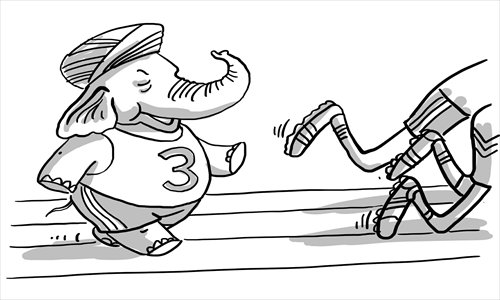IOA farce unveils deep-seated ills

Just months after India achieved its best ever, if still meager, Olympic haul of six medals, the Indian Olympic Association (IOA) was suspended because of excessive governmental interference in its work.
The paradox is that the Indians, who were visibly proud at the country's performance in the London Olympics, were hardly seen lamenting the IOA's loss of place and face in the international arena.
The average television-watching, newspaper-reading Indian is thrilled by the winning performances of Indians in international events - be it the Olympics, Asian Games or Commonwealth Games. But this Indian is not conspicuously upset if the country fails to make a mark. It is simply written off as another bad day, and life goes on.
In 2010, when I returned after several months in China, Delhi as the venue for the Commonwealth Games was the focus of attention and much activity: sport as politics, as business, as event management, as profit-taking, as scandal, as contract-grabbing, as a money spinner for media and as everything else except as an international sports event.
Construction work - roads, bridges, flyovers, stadia - was underway at many places and at a feverish pace.
It reminded me of Beijing during my January 2008 visit for the economic summit of Prime Minister Manmohan Singh and Premier Wen Jiabao - except that Bejing was a lot less messy, had fewer obstructions to movement of people and traffic, and posed less risk to human lives than Delhi.
In India, which remains woefully lacking in infrastructure, the effort to showcase itself as a stage for such an event is welcomed. Roads, power, water supply and urban transport all get a huge boost and, therefore, people do not protest at the expenditure or the disruptions it causes.
In fact, Delhi is a good example of infrastructure development driven by international events, and not only sport, although the 1982 Asian Games proved to be a landmark of urban upscaling.
The Commonwealth Games further upgraded infrastructure and facilities for living, mobility and investment.
Doubtless, the climate of preparation for events such as the Asian or Commonwealth Games offer opportunities that are both beneficial to and exploitative of the people.
Land sharks are the first to move in for the kill - they buy up huge tracts near the venues of events unmindful of the people, whose rights and laws are being trampled under.
These predators are followed by developers and contractors. There develops a nexus between these profiteers, politicians and bureaucrats.
Most of the laborers, on whose sweat and toil the Delhi of the 1982 Asian Games was built, disappeared without collecting even a pittance for their work. The contractors brought in tens of thousands of migrant workers, who were exploited but never paid.
Although much later the Supreme Court of India ordered payment in the case, by then the laborers were no longer traceable.
The beneficiaries of these development spurts are the middle class, which is little concerned with the rights of the underclass that labors to build world-class facilities.
On the contrary, the middle class enjoys the infrastructure and berates the government and politicians for not doing enough for the cause of sport - meaning creating conditions for sportspersons to bring back medals which will make them proud of their country.
Indians are no exception when it comes to a love of laurels and the craving this sparks. The question is: Are they willing to work for it beyond blaming others, for instance, the government and the politicians? The vast majority of poorer city dwellers, who constitute the backbone of the urban industrial economy, suffer dislocation and deprivation during the run-up to an event. But their woes are hardly taken note of, even by the media.
The IOA ban is shameful for India, and no one likes this smear. That those who bring medals would not be playing for the national flag hurts Indian pride. But, in truth, most Olympic events are individual contests. The athletes are there on their own strength and merit; they have made it to the Olympics on their own steam with little or no support from the government, the country or the public.
In any case, no one cares a hoot for these outstanding sportspersons once they are past their 15 minutes of fame on the international stage. Stories abound of Olympians suffering neglect, dying in penury and even having to sell their medal for metal value.
The author is a journalist and writer based in Dehli. He is director of the National Centre for Advocacy Studies in Pune, India, and a member of the editorial board of IDN-InDepthNews, Berlin. opinion@globaltimes.com.cn